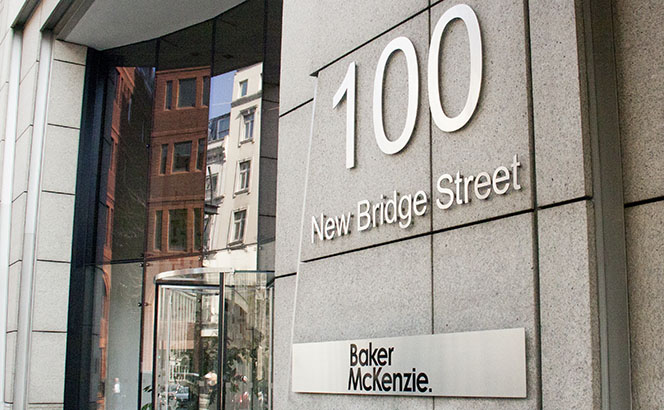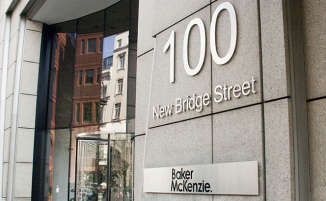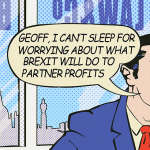Referencing the Presidents Club fallout last month, LB noted that the profession’s record on sexual harassment would receive much tougher scrutiny in the era of #MeToo. While optimists argued post-Weinstein that the profession is now less tolerant of bad behaviour than 10 or 15 years ago, the jaded maintain that the status and rewards handed to partners still encourage abuse… and law firms to turn a blind eye.
But who could have predicted the debate would move on so quickly, with news emerging on 2 February that Baker McKenzie had sanctioned a partner following an allegation of sexual assault?
A settlement was agreed with the junior lawyer who raised the complaint, which included confidentiality obligations on the firm and complainant.
Within days Bakers was facing claims that it lacked rigor in its handling and had sought to silence the victim, including in The Times. On Monday (5 February), Bakers confirmed it was to launch a review of its procedures and handling of the matter, that the accused partner is leaving the firm and that Bakers had been in contact with the SRA.
As is so often the case with such sensitive issues, the focus rapidly shifts from the initial incident and immediate response to examine any short-comings of the subsequent wider handling of allegations, including their disclosure. Bakers conceded as much in the official statement, noting: ‘We are really sorry this incident ever happened and we acknowledge we should have handled it better.’
There are also recriminations that the partner was allowed to take on subsequent senior roles at the firm, a reality that makes it far more sensitive institutionally.
As yet, LB’s direct requests for comment from the departing partner have gone unreturned. Bakers maintains that it is unable to comment as to the identity.
Bakers will get little sympathy for the bind it now finds itself in. Having agreed a settlement with the complainant which obliges it to confidentiality, the firm now struggles to draw a line under the event after it has gone public. Its hands are tied on communication internally and to the outside world.
Meanwhile, an internal investigation will bring scrutiny of whether Bakers has been sufficiently rigorous in handling this complaint and any broadly comparable cases.
This brings us back to the wider issue illustrated by the allegations surrounding Harvey Weinstein last year that has so dramatically recast the debate on treatment of women in the workplace. Those allegations highlighted the controversial use of non-disclosure agreements. In some cases they may have reflected wishes of victims. Yet the ethical dilemma remains: do such private remedies come at the cost of covering up systemic failings and give abusers cover?
To put that quandary in personal terms, I worked on a story more than 15 years ago as a young reporter new to the legal industry. It involved claims that a partner had been kicked out of a firm that wasn’t easy to get kicked out of after an allegation of sexual assault against a junior lawyer. The individuals were tracked down but I abandoned the story on the basis that while I felt there was enough to get it into print, its publication would likely lead to the victim’s identity coming out (the circumstances being particular enough). Her name didn’t come out, I told myself it was the right call ethically and moved on to the next story. Yet the partner continued to get gigs in the legal industry, including in at least one case in which his new employer knew of the allegations. The truth is that I’m less sure now that I made the right decision.
Law firms appear to be less tolerant of abusive or inappropriate behavior by partners than back then. I’ve seen prominent partners quickly exited in response to allegations in recent years.
Things have changed to a point. But enough? People whose opinions I respect tell me law firms are still too prone to brushing complaints under the carpet.
Last month we were approached with a report of an associate at a leading City firm whose internal complaint of inappropriate behaviour by a department head was ignored (we offered to investigate if the individual would speak to us on background). We have also been hearing ominous claims of issues at the Bar in recent weeks.
Statistically, we know the profession’s record on retaining female lawyers in private practice is dire and that scores of women opt out of law for many reasons, even as industry leaders claim to be fighting for progress.
The legal media has generally been responsive when stories of harassment have reached it but it seems that too few have gotten that far and perhaps we’ve simply not focused enough on the issue.
What it comes down to is largely anecdotes and educated guesses. We don’t know how widespread abusive behavior to women is in the law… or how credible the industry’s collective response is. That lack of transparency won’t cut it anymore and doing better than 1998 on sexual harassment won’t be a tenable defence. The industry needs to get its house in order now as only the painfully naïve can believe that Baker McKenzie is where this scrutiny will stop.













